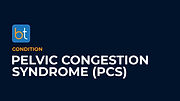BackTable / VI / Podcast / Episode #337
Management of Vulvar Varices
with Dr. Brooke Spencer
In this episode, host Dr. Ally Baheti interviews interventional radiologist Dr. Brooke Spencer about management of pelvic venous disease, endovascular therapies for pelvic varices, and important considerations for treating patients with complex and chronic pain.
This podcast is supported by:
Be part of the conversation. Put your sponsored messaging on this episode. Learn how.

BackTable, LLC (Producer). (2023, June 26). Ep. 337 – Management of Vulvar Varices [Audio podcast]. Retrieved from https://www.backtable.com
Stay Up To Date
Follow:
Subscribe:
Sign Up:
Podcast Contributors
Synopsis
Dr. Spencer serves as the CEO and medical director of Minimally Invasive Procedure Specialists in Denver, CO. Her patients commonly get referred from OB/GYNs for chronic pelvic pain that is refractory to laparoscopic surgery and undiagnosed. She notes that collaborative relationships with women's health specialists and pelvic pain physical therapists are necessary for adequate patient outreach. Classifying cases by the location and nature of the vessel abnormality (i.e. compressive, obstructive, varicose, reflux, congenital) allows her to think about the best treatment for each patient. Targeting proximal veins can improve back and groin pain, dyspareunia, and heavy periods. Iliac vein stenting can improve compressive symptoms 50% of the time. On the other hand, isolated labial pain is best treated by directly targeting labial varices. Perineal ultrasound is a helpful way to locate some varicosities, but Dr. Spencer prefers MRI and digital subtraction venography to get a comprehensive venous picture and correlate symptoms with imaging.
Next, the doctors discuss embolization and foam sclerotherapy. Through her experience, Dr. Spencer has seen sclerotherapy work better in varices with slower outflow and coil embolization work better for varices with more rapid flow. She prefers oversized floppy coils to minimize the risk of migration. With both treatments, there can be significant insurance barriers. It is important to utilize preauthorization specialists and be aware of what the patient’s insurance will cover, in order to better frame a conversation about treatment options.
After the procedure, maximal pain relief can be achieved anywhere between 3 to 6 months. During this period, it is important to counsel patients over adjunct therapies such as pelvic floor therapy, steroids, and puncture aspiration to remove trapped blood. Overall, Dr. Spencer wants IRs to keep in mind that the chronic pain population has faced many misdiagnoses and insurance barriers, so they might harbor mistrust of the healthcare system. It is crucial to acknowledge their feelings and understand their anatomy in order to manage their expectations.
Resources
Pelvic Guru:
https://pelvicguru.com/
Efficacy of Endovascular Treatment for Pelvic Congestion Syndrome:
https://pubmed.ncbi.nlm.nih.gov/27318059/
International Pelvic Pain Society:
https://www.pelvicpain.org/
“The Way Out” book:
https://www.amazon.com/Way-Out-Revolutionary-Scientifically-Approach/dp/059308683X
The Materials available on BackTable are provided for informational and educational purposes only and are not a substitute for the independent professional judgment of a qualified healthcare professional in diagnosing or treating patients. Any opinions, statements, or views expressed are those of the individual contributors and do not necessarily reflect those of the publisher, platform, or any affiliated organization.















